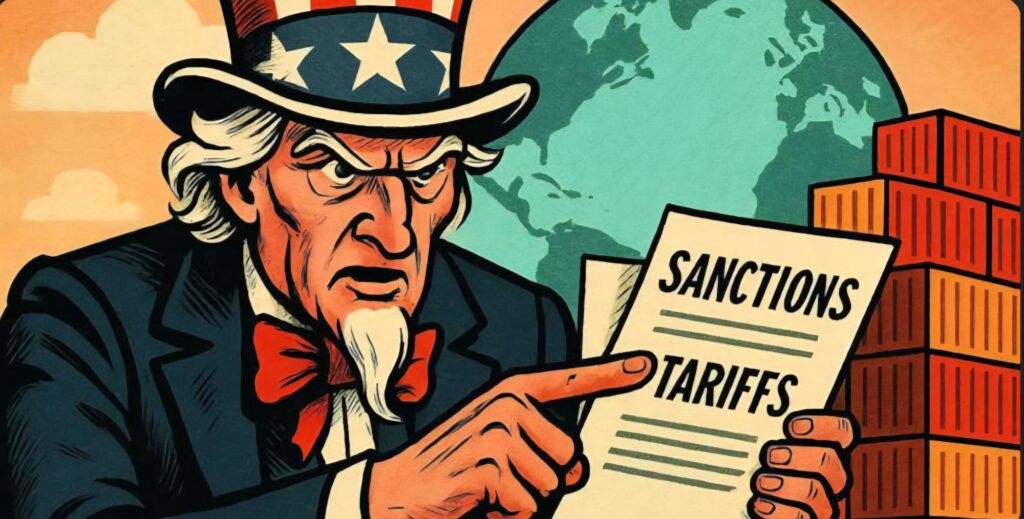
A Blunt Warning — And a Swift Indian Rebuttal
Indian public discourse has been stirred by an unexpectedly provocative statement from NATO Secretary General Mark Rutte during his recent visit to Washington. Rutte, in a move that raised eyebrows across diplomatic circles, warned India of “100 percent secondary sanctions” if it continued its trade relations with Russia — a stark and aggressive message aimed at coercing India into compliance with NATO’s anti-Russia campaign.
But the pushback from India has been swift and measured — and rightly so.
—
Who Gave NATO the Right to Police India’s Foreign Policy?
Rutte’s remarks have triggered sharp questions in Indian strategic circles:
What jurisdiction does the head of a military alliance — created to defend Europe — have in threatening sovereign nations like India with U.S. economic sanctions?
Is NATO overstepping its boundaries, acting as a global enforcer beyond its legitimate reach?
And most crucially: does NATO itself adhere to the standards it seeks to impose on others?
The answers are inconvenient for the West — and revealing for the rest of the world.
—
India–Russia Trade: A Sovereign Relationship, Not a Proxy Decision
To clarify the context, Russia is India’s fourth-largest trading partner, with crude oil imports forming the backbone of this relationship. Indian refineries, including Nayara Energy — recently sanctioned by the EU — process this oil for domestic use and international export, strengthening India’s energy security, creating jobs, and supporting its foreign exchange reserves.
Yet Rutte, seemingly disconnected from both economic realities and diplomatic decorum, sees this vital relationship as collateral damage in NATO’s proxy war with Russia.
—
The West’s Double Standards: Sanction India, Trade with Russia
What makes this more galling is the West’s sheer hypocrisy. Even as NATO lectures India, Western nations continue their own trade with Russia, albeit through shadowy channels or convenient loopholes. From Russian LNG imports to complex oil transshipments, Europe’s own dependency on Russian resources remains, even if the narrative says otherwise.
This duplicity reveals a deeper truth: the rules are different when it suits the West.
Europe won’t stop buying from Russia if it hurts their industries.
But India must stop, even if it disrupts its energy security.
This isn’t diplomacy. It’s coercion dressed in the language of values.
—
India’s Firm Stand: No to Unilateral Sanctions
India’s Ministry of External Affairs (MEA) responded with clarity and confidence: India does not subscribe to unilateral sanctions, reaffirming its long-held principle that only the United Nations Security Council has the legitimacy to impose international punitive measures.
The EU’s recent “18th sanctions package” — which targeted Nayara Energy — has only further alienated Indian sentiment, showing that the West is willing to escalate economic hostilities even against neutral, non-aligned partners.
—
Rutte’s Tone-Deaf Messaging: A Colonial Echo?
As Indian analysts were quick to point out, Rutte’s tone bears a disturbing resemblance to a colonial mindset — one where the West presumes it can dictate terms to the Global South without respect for sovereignty or parity.
His approach betrays a misunderstanding of modern India — a confident, multipolar power, not a compliant outpost of the old world order.
In his zeal to expand NATO’s agenda beyond Europe, Rutte has crossed into territory where NATO has no mandate — diplomatically, geographically, or morally.
—
Conclusion: Security Cannot Be Built on Coercion
If NATO wants a stable world order, it must learn a basic lesson: lasting security is built on mutual respect, not pressure tactics. Trying to coerce India into abandoning its sovereign trade policies won’t bring peace in Europe — and may just alienate one of the world’s most important rising powers.
Mark Rutte may have intended to assert strength. Instead, he’s exposed the fault lines in NATO’s global credibility.
India has made its position clear — and the world is watching.

